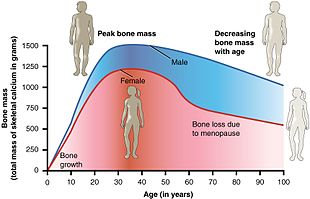Menopause In Human – Zoology Notes – For W.B.C.S. Examination.
Menopause Causes
A woman is born with all of her eggs, which are stored in her ovaries. Her ovaries also make the
hormones estrogen and progesterone, which control her period (menstruation) and the release of eggs (ovulation). Menopause happens when the ovaries no longer release an egg every month and menstruation stops.
Menopause is a regular part of aging when it happens after the age of 40. But some women can go through menopause early. It can be the result of surgery, like if their ovaries are removed in a hysterectomy, or damage to their ovaries, such as from chemotherapy. If it happens before age 40, for any reason, it’s called premature menopause.
Menopause Symptoms
First signs of menopause
Most women nearing menopause will have hot flashes, sudden feelings of warmth that spread over the upper body, often with blushing and sweating. These flashes can range from mild in most women to severe in others.
You may also notice:
Uneven or missed periods
Vaginal dryness
Sore breasts
Needing to pee more often
Trouble sleeping
Emotional changes
Dry skin, eyes, or mouth
Symptoms of menopause
Later symptoms often include:
Fatigue
Depression
Crankiness
Racing heart
Headaches
Joint and muscle aches and pains
Weight gain
Hair loss
Changes in libido (sex drive)
What Happens During Menopause?
Natural menopause isn’t caused by any type of medical or surgical treatment. It’s slow and has three stages:
Perimenopause. This phase usually begins several years before menopause, when your ovaries slowly make less estrogen. Perimenopause lasts until menopause, the point at which your ovaries stop releasing eggs. In the last 1 to 2 years of this stage, estrogen levels fall faster. Many women have menopause symptoms.
Menopause. This is when it’s been a year since you had a period. Your ovaries have stopped releasing eggs and making most of their estrogen.
Postmenopause. These are the years after menopause. Menopausal symptoms such as hot flashes usually ease. But health risks related to the loss of estrogen increase as you get older.
- Premature ovarian failure. When your ovaries prematurely stop releasing eggs, for unknown reasons, your levels of estrogen and progesterone change. When this happens before you’re 40, it’s called premature ovarian failure. Unlike premature menopause, premature ovarian failure isn’t always permanent.
- Induced menopause. This happens when your doctor takes out your ovaries for medical reasons, such as uterine cancer or endometriosis. It can also happen when radiation or chemotherapy damages your ovaries.
How Long Do Symptoms of Menopause Last?
Menopause is different in each woman. In general, the symptoms of perimenopause last about 4 years.
Menopause Diagnosis
You might suspect that you’re going into menopause. Or your doctor will say something, based on symptoms you’ve told them about.
You can keep track of your periods and chart them as they become uneven. The pattern will be another clue to your doctor that you’re menopausal.
Your doctor might also test your blood for levels of:
- Follicle-stimulating hormone (FSH). This usually goes up as you near menopause.
- Estradiol. This tells your doctor how much estrogen your ovaries are making.
- Thyroid hormones. This shows problems with your thyroid gland, which can affect your period and cause symptoms that look like menopause.
- Anti- Mullerian hormone (AMH). Your body makes this in its reproductive tissues. It can help your doctor learn about the reserve of eggs in your ovaries.
Menopause Treatment
Menopause is a natural process. Many symptoms will go away over time. But if they’re causing problems, treatments can help you feel better. Common ones include:
- Hormone replacement therapy (HRT). This is also called menopausal hormone therapy. You take medications to replace the hormones that your body isn’t making anymore. Certain drugs or combinations can help with hot flashes and vaginal symptoms, as well as making your bones stronger. But they can also put you at higher risk of health problems like heart disease or breast cancer, so you should take the lowest dose that works for the shortest time possible.
- Topical hormone therapy. This is an estrogen cream, insert, or gel that you put in your vagina to help with dryness.
- Nonhormone medications. The depression drug paroxetine (Brisdelle, Paxil) is FDA-approved to treat hot flashes. The nerve drug gabapentin (Gralise, Neuraptine, Neurontin) and the blood pressure drug clonidine (Catapres, Kapvay) might also ease them. Medicines called selective estrogen receptor modulators (SERMs) help your body use its estrogen to treat hot flashes and vaginal dryness.
- Medications for osteoporosis. You might take medicines or vitamin D supplements to help keep your bones strong.
Please subscribe here to get all future updates on this post/page/category/website


 +919674493673
+919674493673  mailus@wbcsmadeeasy.in
mailus@wbcsmadeeasy.in







































































































